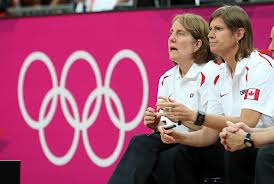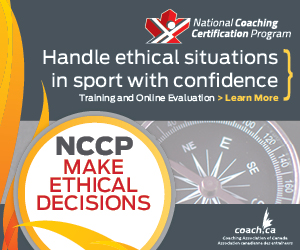 Allison McNeill has been coaching female athletes for over 30 years, and has been the head coach of the Canadian women’s basketball team since 2002. She is also a keynote speaker and conference presenter, having established the Women’s Coaching Circle in 2009, which provides female basketball coaches with the opportunity to interact and learn from senior coaches and facilitators. Over the years, she has devoted thousands of hours to running clinics for youth basketball players and youth coaches in British Columbia.
Allison McNeill has been coaching female athletes for over 30 years, and has been the head coach of the Canadian women’s basketball team since 2002. She is also a keynote speaker and conference presenter, having established the Women’s Coaching Circle in 2009, which provides female basketball coaches with the opportunity to interact and learn from senior coaches and facilitators. Over the years, she has devoted thousands of hours to running clinics for youth basketball players and youth coaches in British Columbia.
At the 2012 Olympic Games in London, the team reached the quarter-finals - their best result in the last 35 years, proving once again, McNeill’s contributions to the sport of basketball and the entire coaching community. Her dedication and recognition to coaching led her to be named a recipient of the Geoff Gowan Award for lifetime contributions to coaching development in Canada. The CAC touched base with Allison at the end of September to talk about the Olympic experience and to get some coaching advice from one of our best.
CAC: What was your biggest success at the London 2012 Olympic Games?
Allison McNeill: There were so many! Our team was playing so well throughout the games - that’s number one. We were also very proud of our team and how they stuck together, played together, and enjoyed the Olympic experience together. They are such an incredible group of women and such an amazing team. Beating Brazil and finishing in the top eight was a great result. This was the first time Canada had been in the Olympics for 12 years! This is the best finish we have had in 35 years. Our athletes also did an amazing job of balancing preparing to play, playing, and enjoying the pageantry of the Olympics.
CAC: How do you think the great showing of the Canadian team at the Olympics will impact the women's basketball scene in Canada?

AM: The theme of the London Olympics was “inspire a generation” and I hope that is what our Olympic team will do. I have had so many parents and athletes comment that they watched all of our games and loved seeing the team play. I really believe that we are doing it right with basketball in this country. We are following LTAD, we are building a strong foundation, we are training our coaches and I firmly believe that our team qualifying for, and playing in the Olympics, is another important event in the growth of our sport. It is so wonderful that for those two weeks of the Olympic Games, young girls could see incredible Canadian female role models playing the sport they love – BASKETBALL!
CAC: What is the most challenging aspect of coaching a team sport?
AM: There is no doubt that the most challenging thing about coaching a team sport is bringing the team ‘together’, getting everyone on the same page and working to achieve a common goal. Team chemistry does not just happen. Athletes, coaches, and support staff have to buy into, and then work at, building the team chemistry and culture. Everyone has to accept her role and contribute to the team success. There are no small roles on a team going to the Olympics, everyone is important. With a team sport, the only chance you have of getting to the Olympics is if you do it together – no one is going, unless everyone is going!
CAC: Do you set specific goals for every game or are they always the same?
AM: We have specific goals for each game and a different game plan for each team we play. But we also have our ‘game plan’ that includes doing what we do well and that does not change regardless of whom we are playing. Basketball at the Olympic Games, like all team sports, is played over the entire two weeks. It is crucial to be able to prepare mentally and physically for training and playing every day.
CAC: How do you motivate your team and keep them focused during a big game?
AM: This is the national team so the athletes we get are extremely self-motivated! We also work with an amazing sports psychologist, Roger Friesen, who has helped this team over the past four years to be focused and ready to play in the big competitions. As a coaching staff we try to stay calm and focused so that we can make the needed adjustments in the games. It is the art of coaching to know when you need to get a little intense!
CAC: What are the most important character building qualities to teach your players?
AM: There are so many qualities that are important in team sport, important in life, and important if you want to be successful at whatever you chose to do. First and foremost as a coach I look for athletes with those characteristics and qualities. Then we help to build on what each of our athletes already has. We have a set of core values for our team – what we believe in:
- Trust and Integrity
- Accountability
- Respect
- Commitment
- Honest communication
- Relentlessness
- Resiliency
CAC: Looking back at your first season, what has been your biggest improvement as a coach?
AM: Wow, it is hard to remember back to my first season…it was so long ago! I really can’t say just one thing that I have improved on as I feel that there are so many things that I have improved on over the years, but here are a few:
- My ability to stay calm under pressure;
- Not being afraid to ask for help/support from others;
- Organizing my time and finding a little balance in my life;
- My knowledge of the game at the international level;
- Listening to our veteran athletes who have so much knowledge and passion for not only the game, but also for Canada.
CAC: What are the biggest changes in coaching you've noticed since you started?
AM: Like everything in our world I think the technology used in coaching has really changed. We do a lot more film/video analysis than when I first started coaching. It is wonderful and makes the job even more fun than it used to be. I also see the use of other professionals, sports psychologists, nutritionists, physiotherapists, doctors, strength and conditioning specialists, exercise physiologists, etc. as a must now. Ten to twelve years ago this was not common place in team sport, but it certainly is now. It is amazing for our athletes to have these resources at their fingertips and to know that they can get world-class help and support. The athletes are staying in the game much longer. Where most women athletes stopped playing at 22 or 23 years old in the past - that is no longer the case. The USA team that won the Olympic gold had seven players over 30 years of age and their average age was 28.7.
CAC: What is the biggest coaching lesson you learned as part of the NCCP?

AM: Once again I feel that I have learned many lessons from my coach training that it is difficult to pick out one lesson. Several years ago I did my NCCP Level 4 and the biggest lesson I learned from that was that I could not possibly be an expert in all areas and that every coach needs help and support. I was lucky enough to meet some amazing teachers through my Level 4 at the University of the Fraser Valley. Not only did they help me, but they also helped our women’s national team.
So one of the big lessons I learned from my NCCP Level 4 was to network and to ask for help! Surround yourself with great people! I had fabulous assistant coaches with the national team, not to mention the best of the best when it comes to physiotherapists, doctors, strength and conditioning specialists, nutritionists and sports psychologists. I am also a big believer in being a life-long learner; the more you can learn and stay on the cutting edge the better your athletes will be.

